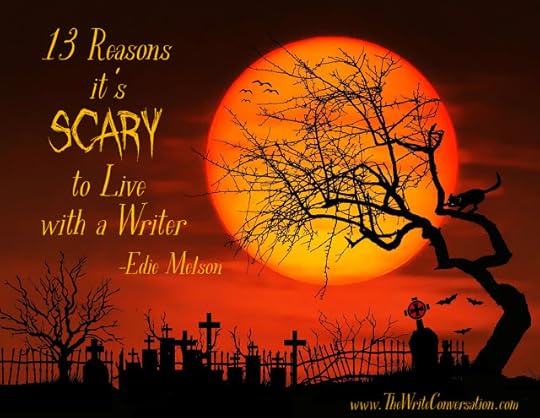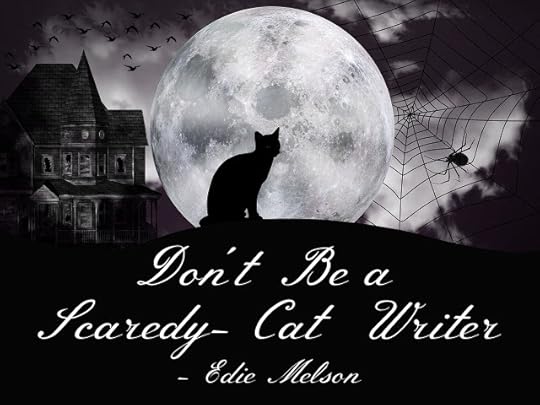Edie Melson's Blog, page 223
October 11, 2019
13 Reasons it's Scary to Live with a Writer

By Edie Melson @EdieMelson
There are a lot of scary things about living with a writer. My husband and family know this only too well. Unfortunately, they’ve been subjected to just about everything on the list. And yet they still love me—even more than that they appear to enjoy my career choice at times.
Still, if you’re not expecting some of these things, they can be frightening. So since it’s Halloween I thought I’d give those unsuspecting family members a sneak peak at what they’re in for with the 13 scariest things about living with a writer.
1. Going out in public can turn into a foray into the art and craft of eavesdropping. As writers—whether we writer fiction or nonfiction—we’re always looking for a good story. And I’ve found a lot of good stories by eavesdropping. For some reason this tendency makes my husband and family nervous.
2. Sometimes family members are drafted as impromptu actors when the resident writer is trying to accurately portray a scene. I'll just let your imagination run wild on this one. Trust me, it won't come close to the reality. 'nough said.
3. Normal dinner conversation can be off-putting for unsuspecting meal-time guests. For some reason people don’t like to discuss gory details during dinner—go figure.
4. Normal dinner conversation held at a restaurant can make those around you nervous. I remember the odd looks my husband and I got once while we were out. I was discussing different ways to kill people without leaving a trace. The looks from other diners were comical, to say the least.
5. Writer’s block is felt by the entire family. Ever hear the saying, if momma ain’t happy then nobody’s happy? Well if momma is a writer, then that’s doubly true of writer’s block.
6. Normal hours aren’t so normal. Writers write when inspiration hits. Hopefully that’s during daylight hours. But if the muse works the graveyard shift, so does the writer. Beyond that, if inspiration strikes at night, experienced writers know to write it down because it won't stick around until morning. It's the writing it down part that can cause family members difficulty. Imagine lights snapped on at 2am, loud exclamations as sleep-fogged writer tries to find a pen that works and something to write on. You get the idea. Inspiration isn't quiet.
7. Writers have an insatiable curiosity. I believe that trait is one of the reasons many of us are so successful. We go through life with a goal of finding out who, what, when, where, why and how. My husband refers to this as being nosy, but I think it’s a trait that’s stood me in good stead with my chosen career.
8. Writers don’t just write books, they also collect them. For some reason reading and writing go hand in hand. This means stacks of books everywhere. If you live with a writer, just get used to it. This is one battle you’ll never win.
9. Family situation frequently end up in print. Oh don’t worry too much, we’re careful to change the names. But the tendency of writers to write what we know, can almost always leave a trail back home.
10. Writers have a love/hate relationship with technology, especially computers. We all have our favorite brands and are fiercely loyal (can anyone say Apple?). But we also are the first ones to rail against the necessity of relying on such temperamental beasts.
11. Writers wear their hearts on their sleeves. A good review puts us over the moon. A bad review makes us vow to give up writing altogether. Just get ready for it, we’re an emotional bunch.
12. And along that line, writers are insecure. No matter how many good comments we get, it’s the one bad one that we’ll remember. We’ll dissect it, analyze it, and agonize over it for weeks.
13. We’re always afraid our last book (article, devotion, blog post, etc) was the last one we have in us. We’re certain we’ve reached the pinnacle of our career and the rest won’t be worth reading.
This is my list of the scariest things about living with a writer. I'd love to know what you'd add to the list. Be sure to leave your thoughts in the comments section below.
Don't forget to join the conversation!Blessings,Edie
TWEETABLESIn honor of Halloween, 13 Reasons it's Scary to Live with a Writer - @EdieMelson (Click to Tweet)
 Edie Melson is a woman of faith with ink-stained fingers observing life through the lens of her camera. No matter whether she’s talking to writers, entrepreneurs, or readers, her first advice is always “Find your voice, live your story.” As an author, blogger, and speaker she’s encouraged and challenged audiences across the country and around the world. Her numerous books reflect her passion to help others develop the strength of their God-given gifts and apply them to their lives. Connect with her on her website, through Facebook, Twitter and Instagram.
Edie Melson is a woman of faith with ink-stained fingers observing life through the lens of her camera. No matter whether she’s talking to writers, entrepreneurs, or readers, her first advice is always “Find your voice, live your story.” As an author, blogger, and speaker she’s encouraged and challenged audiences across the country and around the world. Her numerous books reflect her passion to help others develop the strength of their God-given gifts and apply them to their lives. Connect with her on her website, through Facebook, Twitter and Instagram.
Published on October 11, 2019 22:00
October 10, 2019
The Cure for Discouraged Writers

By Joshua J. Masters @JoshuaJMasters
Christian writers are not immune to rejection and struggle. I’d like to say I responded to a recent rejection by saying, “What a delightful part of God’s plan for this project,” but that’s not exactly how I felt. When we feel discouraged in our writing, how do we overcome the negative story we tell ourselves and recapture the heart of what God’s called us to do?Perhaps the most famous poem every written was penned by one of the greatest poets and songwriters of all time. Maybe you’ve read it.
The Lord is my shepherd;I shall not want.
He makes me to lie down in green pastures;He leads me beside still waters…(Psalm 23:1-2 NKJV)
The promise of serenity expressed in Psalm 23 is hard to grasp (or even read) when you’re walking in a dark place, isn’t it? I sometimes feel like we read this passage at funerals because it seems impossible to attain that kind of comfort while we’re still living on this side of eternity. But we’re meant to claim its promise of hope now, even as we “walk through the valley of the shadow of death.” But how?
David likely wrote Psalm 23 toward the end of his life, after he’d learned how to live in the promise of God’s peace through any circumstance or trial.
That’s sounds great but when I get rejected by an agent, can’t hit my word count, don’t feel motivated to write, or get a rough critique, I don’t feel anything like David.
David didn’t always feel that way either. He went through dark seasons of discouragement and pain. Consider the passage from Psalm 22 below. Notice the heart-wrenching emotional pain David is feeling as he writes:
I’m a bucket kicked over and spilled, every joint in my body has been pulled apart.My heart is a blob of melted wax in my gut.I’m dry as a bone, my tongue black and swollen.They have laid me out for burial in the dirt.Now packs of wild dogs come at me; thugs gang up on me.They pin me down hand and foot, and lock me in a cage—a bagOf bones in a cage, stared at by every passerby.They take my wallet and the shirt off my back, and then throw dice for my clothes.You, GOD—don’t put off my rescue! Hurry and help me!Don’t let them cut my throat; don’t let those mongrels devour me.If you don’t show up soon, I’m done for—gored by the bulls, meat for the lions.(Psalm 22:14-21 MSG)
David was as discouraged and defeated as a person could be, but later on—after some healing in his life, he writes one of the most famous passages in the Bible about peace and trust in the Lord.
Maybe you’re feeling discouraged right now. Maybe you’re thinking, The twenty-third psalm is fine for David, but I just don’t feel that kind of peace in my life.
Well remember, in Psalm 22, David felt like he was being attacked by wild dogs and that he was at the edge of death.
He had to learn how to live in God’s peace. How did he do that? What was the cure for his discouragement?What’s the transition that changed David’s perspective from fear to peace?
What changed in David’s writing?
The answer is actually in the next line of Psalm 22.
Where did we leave off? Oh, yes…
If you don’t show up soon, I’m done for—gored by the bulls, meat for the lions. (MSG)
But even though there’s no sign anything in his circumstances changed, David’s heart changes in the next verse when he writes,
ButYou have answered me.I will declare your name to my brethren;In the midst of the assembly I will praise you.(Psalm 22:21b-22 NASB)
In his darkest moment, David turned to God and worshipped him. At the end of his soliloquy of self-loathing, he moves his focus away from his own problems, and worships God—the God who had ALREADY answered him. Worship changed his heart and encouraged him because through his praise, he was reminded of God’s promises.
God has made promises to you too. Being called to write for God doesn’t absolve you from suffering, but it does provide a solution for wallowing in it.
Praising God isn’t just a response to the good things He’s done for us, but the cure for moments of uncertainty. It reminds us that God is still working, that He’s still good, and that His plan is trustworthy. But above all, it reminds us He’s worthy of praise.
Maybe you didn’t get a book contract, maybe your blog doesn’t get enough traffic. Maybe there’s something in your personal life that makes you feel like meat for the lions. Whatever it is, in your darkest moment, find a way to worship God.
Then watch Him turn your twenty-second Psalm into your twenty-third.
TWEETABLE
The Cure for Discouraged Writers - @JoshuaJMasters on @EdieMelson (Click to Tweet)
 Joshua J. Masters is a pastor, author, and speaker. He’s been featured on CBN Television, HIS Radio, and the Light Radio Network. Josh is the author of American Psalms: Prayers for the Christian Patriot and is a contributing author for Feed Your Soul, Refresh Bible Study Magazine, and One Christian Voice. Josh has also worked as an actor and crew member in the film industry (SAG/AFTRA) and continues to have a passion for film. He lives with his wife, Gina, and Franklin the Pup outside Greenville, South Carolina where he serves as a speaking and care pastor.
Joshua J. Masters is a pastor, author, and speaker. He’s been featured on CBN Television, HIS Radio, and the Light Radio Network. Josh is the author of American Psalms: Prayers for the Christian Patriot and is a contributing author for Feed Your Soul, Refresh Bible Study Magazine, and One Christian Voice. Josh has also worked as an actor and crew member in the film industry (SAG/AFTRA) and continues to have a passion for film. He lives with his wife, Gina, and Franklin the Pup outside Greenville, South Carolina where he serves as a speaking and care pastor.Josh would love to connect with you on his website, www.joshuajmasters.com or engage with you on Facebook, Twitter, Instagram, or Goodreads.
Published on October 10, 2019 22:00
October 9, 2019
Write On, Scribes!

by Julie Lavender @JLavenderWrites
Last week, while Lori Hatcher penned the words for her September 27 post on The Write Conversation, I spoke at a gathering of the Jolly Christians, the senior ministry of a small church about twenty minutes from my home. Interestingly, Lori and I shared common Bible characters in our thought process. Lori’s delightful post about “Barry” and “Jerry” can be found here on An Unlikely Publishing Story.To summarize very briefly the passage of scripture related to our similar discussions, found in Jeremiah 36, Jeremiah dictated God’s words to Baruch, the scribe, who wrote on a scroll the words that God spoke about the fate of King Jehoiakim. The words on the scroll eventually made it to the king, but not until it had been heard by and passed through the hands of several important officials, including a man named Elishama who was described as a scribe, or secretary, to the king.
Well, the king not only didn’t heed the words, but he cut the scroll into pieces and burned it in the fire. God later removed the throne from him because of his actions.
Three times, the words “Elishama the secretary” are mentioned in this passage: in verse twelve, showing his presence during the reading of the scroll, and verses twenty and twenty-one when it was mentioned that the scroll was taken to Elishama’s room.
That’s it—that’s all the Bible says about Elishama. That’s the end of the story God wrote about Elishama as recorded in the bible.
However—here’s the cool part. In 1975, an archaeological discovery about forty-four miles southwest of Jerusalem unearthed small lumps of clay that were impressed with a seal, which, as you know in ancient times were used to represent an official signature for someone. The clay seals were stuck to a document to identify the sealer and to make sure the document hadn’t been opened or altered from the time it was written.
One of those seals belonged to Elishama, and read “Elishama servant of the king,” proving that he was indeed a scribe in the exact time frame and with the exact position that scripture describes.
From this obscure Bible character who is just the tiniest blip on God’s timeline, seemingly from the three times he’s mentioned in scripture, years and years later, God used Elishama’s story to once again prove the historical reliability of scripture. Just more evidence to validate 2 Timothy 3:16—“All Scripture is God-breathed and is useful for teaching, rebuking, correcting, and training in righteousness.”
God used the tiniest detail of Elishama’s role as scribe, or secretary, an obscure person mentioned in the Bible only three times—he used that very minor detail to validate the words recorded in scripture to archaeologists hundreds and hundreds of years later.
When we think the plot of our life is small or insignificant, I think it will benefit us to know that when God writes our story, no matter how small a role it seems like we play, in God’s kingdom, it’s all part of his masterpiece and every stroke is vitally important on God’s timeline. That thought should be a reminder to us to consistently live out one of my favorite verses: Colossians 3:23—“Whatever you do, do it enthusiastically, as something done for the Lord and not for men.”
Elishama did his job enthusiastically for the Lord, but it certainly blessed a lot of men and women in his day and a whole crew of archaeologists years later. As writers, the very words we put on paper or screen, done enthusiastically for the Lord, just might be the same words that prove the reliability of scripture and God’s faithfulness for generations to come.
Write on, scribes!
TWEETABLE
Write on, Scribes! Encouragement from @JLavenderWrites on @EdieMelson (Click to Tweet)
 Julie Lavender read newspapers all over the country while her husband served as a Navy entomologist for twenty years. She wrote for the children’s section of the Denver Post for four years. Currently, she reads and writes for her local newspaper, the Statesboro Herald, back in their Georgia hometown and loves the interesting people she meets as a journalist. Julie also writes for GuidepostsPublications, other magazines, a couple of homeschooling blogs, Just18Summers.com, and many compilations. Combining her education degree, love of homeschooling, and joy of celebrating, Julie wrote a devotional entitled, 365 Days of Celebration and Praise, a party planning book called, Creative Sleepovers for Kids, and three teacher resource books for the religious division of Carson-Dellosa. Julie and David are enamored with their four adult children, one son-in-love, and one gorgeous grandson. Keep up with Julie on social media and at her blog at julielavender.blogspot.com.
Julie Lavender read newspapers all over the country while her husband served as a Navy entomologist for twenty years. She wrote for the children’s section of the Denver Post for four years. Currently, she reads and writes for her local newspaper, the Statesboro Herald, back in their Georgia hometown and loves the interesting people she meets as a journalist. Julie also writes for GuidepostsPublications, other magazines, a couple of homeschooling blogs, Just18Summers.com, and many compilations. Combining her education degree, love of homeschooling, and joy of celebrating, Julie wrote a devotional entitled, 365 Days of Celebration and Praise, a party planning book called, Creative Sleepovers for Kids, and three teacher resource books for the religious division of Carson-Dellosa. Julie and David are enamored with their four adult children, one son-in-love, and one gorgeous grandson. Keep up with Julie on social media and at her blog at julielavender.blogspot.com.
Published on October 09, 2019 22:00
October 8, 2019
Publishing as a Second Language—What It Means to Write on Assignment

by Linda Gilden @LindaGilden
As a new writer I remember hearing seasoned writers talk about writing assignments and wondering How do you ever get to that point? The short answer is lots of hard work! But if you are one of those writers who would love to have editors calling or emailing you with an assignment, let’s talk about how to get there.First of all, what exactly does it mean to write on assignment?Writing on assignment is pretty clear. You are writing an article or book that the editor or publisher has asked you to write. He or she has assigned that project to you, has given you a specific slant, word count, and deadline. All writers hope to someday be able to write on assignment.
So, how do you do that? 1. Perfect your writing style. Learn the craft of writing and how to do it with excellence. Editors appreciate and remember writers who always send material that does not need a lot of editing and turn their writing in on time.
2. Submit regularly. Editors need to know you are capable of writing well and meeting deadlines. When they see you are submitting regularly, they know you can do that. Pitching often to the same publication will give editors the opportunity to get to know you and your work.
3. Build relationships with those in the publishing business. At my first writers conference I met the editor of a devotional magazine. After a few conversations he asked, “Would you like an assignment for a week of devotions?” Scared me to death but I knew this was a big step in the direction of where I wanted to be as a writer. So I immediately said an enthusiastic, “Yes!” This was a great learning experience and the first of many such assignments. But it wouldn’t have happened if I hadn’t met the editor and spent some time getting to know him and his publication.
4. Keep your eyes and ears open. Article assignments can turn up in the strangest places.You can search the internet and job boards to find writing opportunities.One of the most interesting ways I found an assignment was from my washing machine repairman. He had fixed a washing machine the day before for a person who made a great feature story.Look at magazine theme lists. Is there something there that interests you?Talk to other writers who write regularly.
Many writers think if you don’t have connections there is no way to generate assignments. But looking regularly at theme lists, job boards, and talking to other writers will get you quickly on the right path. As you establish yourself as a good and dependable writer with a specialty in a few areas, you will come to mind as editors search for writers to cover specific topics.
Until you find yourself receiving regular assignments, why not give yourself an assignment or two. Decide on a subject, find a magazine that needs your information (be sure to study their guidelines), then put your deadline on the calendar. It won’t be long before editors will be giving you theirdeadlines to add to the calendar!
What experience do you have with writing on assignment? Share your tips and comments in the section below.
And don't forget to join the conversation!
TWEETABLEPublishing as a Second Language - What it Means to Write on Assignment?@LindaGilden (Click to Tweet)
 Linda Gilden is an award-winning writer, speaker, editor, certified writing and speaking coach, and personality consultant. Linda is the author of 19 books and over 1000 magazine articles. She enjoys every meeting with editors and knowing we are all part of the same team. Linda’s favorite activity (other than eating folded potato chips) is floating in a pool with a good book surrounded by splashing grandchildren—a great source of writing material! www.lindagilden.com
Linda Gilden is an award-winning writer, speaker, editor, certified writing and speaking coach, and personality consultant. Linda is the author of 19 books and over 1000 magazine articles. She enjoys every meeting with editors and knowing we are all part of the same team. Linda’s favorite activity (other than eating folded potato chips) is floating in a pool with a good book surrounded by splashing grandchildren—a great source of writing material! www.lindagilden.com
Published on October 08, 2019 22:00
October 7, 2019
The Woes of Unsolicited Manuscripts in Publishing

by Cindy K. Sproles @CindyDevoted
No unsolicited manuscripts! Ah, the pain of reading or hearing those three words is every writer’s nightmare. As the squeeze on the publishing industry grows tighter and tighter, so grows the frustration of the new writer.Everywhere we turn, we see the words no unsolicited manuscripts. With such stop signs how could we expect to ever be published? The greater question becomes, “Why don’t they accept unsolicited manuscripts?”
With the fall of the 2008 economy, publishers had no option but to cut positions. Houses were turned upside down, editors were pared to the nub and work – well. . . the work only continued to increase. Something had to give and unfortunately, it was the ability to place your manuscript, along with a query letter, into an envelope and mail it directly to the publishing house.
Desk after desk lined the rooms where editors once sat. Behind their chairs, “the slush pile.” If a publisher was forced to cut two editors, their work fell on the shoulders of the one left. One person cannot do the work of three. This forced the new phrase, “We do not accept unsolicited manuscripts.”
This trend began before the downward turn in the economy, but until that point, most new authors could still submit directly to the publisher. As trends shifted, publishers began to rely on agents to do the vetting. Before long, agents became, for lack of better words, “the gatekeepers.” Publishers trusted the eyes and instincts of the agent to read the work and only submit the cream of the crop.
It’s far and between now, to find a larger house that will accept unsolicited work. Though publishers still have mounds of work to sort through, what they are receiving is quality work. Their issue now, is choosing which good work to publish.
The point is, writers must produce the best work possible before they consider submitting to an agent. Grant that writing is subjective, at least if it’s well written, its opportunity to slip past the gatekeepers is much better.
When I teach at conferences, one question continues to pop up. “What can I do to get an agent and do I really need one?”
The truth is, there are folks who can voice an argument for either side of the question. Some insist in order to get through the gate to the publisher, you must have an agent. While others insist they are able to sell their work to publishers without an agent.
Small independent publishers are the exception to the rule. They like to keep things simple, and though they accept agented authors, they will often work with writers without agents. The general rule is, that they meet the author at a conference. If they do not see you at a conference, then many times, that “No unsolicited manuscript” law rears its ugly head. Regardless of the publisher it boils down to manpower and houses simply do not have enough manpower to manage a deluge of unsolicited manuscripts.
If you want to break through the gate, here are some suggestions to help better the odds:Invest in your future. Hire a free-lance editor to do a content edit. – Despite your own editing skills, often you cannot see holes in the work, redundancies, or character flaws. You are just too close to the work. You can always work through your critique group to catch typos and misspellings, but major plot issues need to be searched out by the pros. It costs you some money, but the investment – whether it sells or not, is a good one.Shop for and query agents who read and sell in your genre. It’s a common mistake to befriend an agent at a conference and assume because you attended a 15-minute appointment with them, that they will represent you. They may not even read in your genre. Do your homework. Locate agents that are experienced in your genre. It takes time to find a fit.
Don’t submit your work until it’s ready. I have new writers constantly approaching me to acquisition their books at conferences long before the work is vaguely ready to be acquisitioned. Take your time. Learn the craft. Hone it. Make the work the best it can be before you send it to an agent. Remember, these folks talk amongst themselves so don’t become fodder by submitting a poorly done manuscript. It may follow you for some time.
In the words of Robert Benson, acclaimed Christian author, “Write today. Edit tomorrow. And then edit some more. And by the way, edit some more. Edit until every word is perfectly placed like notes on a scale, harmonizing and keeping beat to the rhythm of the story.”
Strive to be the best writer you can be. Do your best work every time and before long, you will have an agent. You will become published. No unsolicited manuscripts will be a thing in your past.
TWEETABLE
The Woes of Unsolicited Manuscripts in Publishing - @CindyDevoted on @EdieMelson (Click to Tweet)
 Cindy K. Sproles is an author, speaker, and conference teacher. She is the cofounder of ChristianDevotions.us and the executive editor of ChristianDevotions.us and InspireaFire.com. Cindy is the managing editor for Straight Street Books and SonRise Devotionals, both imprints of Lighthouse Publishing of the Carolinas. She is an award-winning and best-selling author and the director of the Asheville Christian Writers Conference. Visit Cindy at
www.cindysproles.com
. @cindydevoted
Cindy K. Sproles is an author, speaker, and conference teacher. She is the cofounder of ChristianDevotions.us and the executive editor of ChristianDevotions.us and InspireaFire.com. Cindy is the managing editor for Straight Street Books and SonRise Devotionals, both imprints of Lighthouse Publishing of the Carolinas. She is an award-winning and best-selling author and the director of the Asheville Christian Writers Conference. Visit Cindy at
www.cindysproles.com
. @cindydevoted
Published on October 07, 2019 22:00
October 6, 2019
Starting Where You’re At (in Book Marketing and Life)

by Ralene Burke @RaleneB
I have had one CRAZY summer. Insane. Unyielding. Emotional. In fact, I’m convinced August was a blackhole that didn’t actually happen. Before I could recover, my book release time was here, and I had hardly done anything I had planned to do. This launch was going to be a total failure.
Unforeseen Circumstances First, a little background… My husband and I decided early this year that we were going to move from Kentucky to Virginia to be closer to my family (and so I could be nanny to my precious baby nephew). This was an unexpected blessing—and one that threw off all my best-laid plans.
So we forged a new plan: how we would fix up the house, sell it, and buy a new home all before the end of summer. Unfortunately, it’s now October, the house has just gone on the market, the kids and I are living with my parents in Virginia while my husband is still in Kentucky, and we’re just praying we can get into a new house before Thanksgiving.
A whole host of unexpected disasters and unforeseen circumstances led to this particular situation. Am I frustrated? Am I overwhelmed? Am I struggling? Yes, yes, and yes.
But I can’t wallow in this depression forever. God has a plan. God will make a way. And I choose to believe Him.
For now, I have to start where I’m at.
Step Back
I can’t control the world—though my Type-A personality really, really, REALLY wants to. But I can control ME: my reactions, my emotions, my actions. My current life situation may not be ideal, it is certainly not what I planned, and yet there are benefits and blessings that still abound.
So, I take a deep breath, evaluate my current situation, and plan—not for the future—for the now. What can I do now? What will help now? How can I move forward now?
In my writing life, I had a book release last week. Sword of Soter , Book 2 in the Sacred Armor Trilogy, released from Elk Lake Publishing Inc. with very little fanfare on my part. I woke up one morning and realized, “Hey, the book launch is NEXT week. I’m not ready!”
In the previous couple of months, I had made 4 trips back to Kentucky (2 of them for more than a few days), suffered a medical setback that left me incapacitated for much of August, and struggled with life in general.
I knew the book release was coming. In fact, before the move, I even started planning out the schedule of book marketing tasks to complete before the release. How much of that did I accomplish? Almost none of it.
Now, before you think I’m bemoaning a poor book launch due to poor planning, that is not the purpose of this post. I own up to the fact that I let myself become overwhelmed and turn inward, ignoring reality, which is my “fight-or-flight” reaction when things get too complicated.
The purpose of this post is to encourage others who might find themselves in similar situations to take a step back, evaluate their circumstances, and start where they’re at.
Start Where You’re At
How do you eat an elephant? One bite at a time.
We’ve all heard that joke before, but it’s so true. When we get overwhelmed, sometimes our circumstances seem too big, like just the thought of them will crush us. We can’t focus on the big picture. We have to focus ONE. SMALL. THING.
My book launch didn’t have a lot going for it. I had not been promoting it much. I didn’t have a pre-order set up. I didn’t even have ARCs for my street team. What did I have?
Well, I did HAVE a street team. I could start with them. They were already excited about Sword of Soter. They’d all read Armor of Aletheia and LOVED it. They couldn’t wait to find out what happened next. I let their enthusiasm carry me from task to task. I let them have some input on things like cover and graphic designs. THEY made my cover reveal—which happened a week before the release—a great success.
I also like to create contests within the street team to encourage them to participate in launch month activities, like leaving reviews, sharing on social media, requesting the book at their local libraries, etc. Sometimes I let THEM come up with the activities—they can be quite creative.
And I did have a newsletter. Granted, it’s not a very large one. But again, it’s people who have stuck by me for the past couple of years. They enjoy my stories. So I invited them to my street team. I let them know about the cover reveal. I sent out an email blast on release day. I’ll send one out again to remind them to leave reviews.
My goal during launch week, especially given the lack of pre-launch buzz, was not to flood Amazon with a ton of sales over a couple of days, but to slowly build sales over the week, the month. To allow Amazon’s algorithm to do its job in pushing (and keeping) my book up in the ranks so new eyes would see it.
While I may not have had the best book launch ever, I’m encouraged by the response I’ve seen so far. And while I may not be where I wanted to be in life at this moment, I’m learning to roll with the tide and allow God’s blessings to encourage me anyway. It’s a process. But when I let God do the leading, I find that I’m not as overwhelmed and frustrated. Instead, I look forward to seeing how He makes everything work out for the better.
Are you at a point in your life where you need to step back, breathe, then start where you’re at? Feel free to share a little bit in the comments, and I’ll be sure to add you to my prayer list. If not, what new and exciting things is God doing in your life?
TWEETABLEStarting Where You’re At (in Book Marketing and Life) - @RaleneB on @EdieMelson (Click to Tweet)
 Whether she’s wielding a fantasy writer’s pen, a social media wand, or a freelance editor’s sword, Ralene Burke always has her head in some dreamer’s world. And her goal is to help everyone #SHINE Beyond their circumstances! Her novels, Bellanok and Armor of Aletheia, are available on Amazon. More fantasy novels coming soon!
Whether she’s wielding a fantasy writer’s pen, a social media wand, or a freelance editor’s sword, Ralene Burke always has her head in some dreamer’s world. And her goal is to help everyone #SHINE Beyond their circumstances! Her novels, Bellanok and Armor of Aletheia, are available on Amazon. More fantasy novels coming soon!When her head’s not in the publishing world, she is wife to a veteran and homeschooling mama to their three kids. Her Pinterest board would have you believe she is a master chef, excellent seamstress, and all-around crafty diva. If she only had the time . . . You can also find her on Facebook, Instagram, Twitter, or at her website.
Published on October 06, 2019 22:00
October 5, 2019
Our Words as an Instrument of Gentleness

by Audrey Frank @AudreyCFrank
A gentle answer turns away wrath, but a harsh word stirs up anger (Proverbs 15:1).
The United States had just invaded Iraq, and we were Americans living in a Muslim country. The national news was not kind, nor was it censored. Images of children, victims of bombs, flashed daily across television screens, along with a call to defeat the infidel. This particular day I was standing at the local shop in my neighborhood, waiting in line to buy milk. An old woman wearing a niqab, the veil that covers the lower half of the face, drew near. When she saw me, she began to curse. Seeking to publicly shame me, she shouted for all to hear, “This American is not welcome here. She and her kind are evil.” The male shop owner, who knew me and my family, watched me to see what my reaction would be.
In a rare moment of courage, I placed a gentle hand on her shoulder and softly said a traditional Arabic blessing to her, “May God forgive, mother.”
Her eyes grew wide as I continued, “The Messiah’s heart is broken for the nations at war. May God bring peace to my family and yours.”
The little cluster of people around the shop window all started talking at once.
“See, mother, she is a woman of faith!”
“Amen! God is merciful to all nations!”
She placed her wrinkled hand on my back and patted me, gently. The vitriol that spewed only moments before was gone.
A gentle answer had not only turned away wrath, but it had also opened the door to a conversation about faith.
There is much angry shouting in our culture today. The news is not kind, nor are most of the voices demanding to be heard. A gentle answer is counterintuitive, unnatural. The writer of Proverbs 15:1 understood that the natural response to painful words is anger. Harsh words stir up anger. Gentle ones disarm it.
As writers, we have the honor and privilege of wielding gentle words that have the power to disarm anger and rage. It helps greatly to spend regular time in God’s Word. The next time we encounter wrath, His words will come to mind, instructing us how to respond. It wasn’t natural for me to touch a stranger in public, nor to address someone shouting curses at me. A gentle answer turns away wrath rose to my mind and my next step was clear.
It takes self-control and courage to be gentle. But the result is a more peaceful world and open doors to share about our Messiah Jesus.
Lord, use me and my words as instruments of your gentleness in an angry world. Amen.
TWEETABLE
Our words as an instrument of gentleness - @AudreyCFrank on @EdieMelson (Click to Tweet)
 Audrey Frank is an author, speaker, and storyteller. The stories she shares are brave and true. They give voice to those whose words are silenced by shame, the hard things in life that don’t make sense, and the losses that leave us wondering if we will survive. Audrey and her family have spent over twenty years living and working among different cultures and world views, and she has found that God’s story of redemption spans every geography and culture. He is the God of
Instead
, giving honor instead of shame, gladness instead of mourning, hope instead of despair. Although she has three different degrees in communication and intercultural studies, Audrey’s greatest credential is that she is known and loved by the One who made her.
Audrey Frank is an author, speaker, and storyteller. The stories she shares are brave and true. They give voice to those whose words are silenced by shame, the hard things in life that don’t make sense, and the losses that leave us wondering if we will survive. Audrey and her family have spent over twenty years living and working among different cultures and world views, and she has found that God’s story of redemption spans every geography and culture. He is the God of
Instead
, giving honor instead of shame, gladness instead of mourning, hope instead of despair. Although she has three different degrees in communication and intercultural studies, Audrey’s greatest credential is that she is known and loved by the One who made her.Her upcoming book, Covered Glory: The Face of Honor and Shame in the Muslim World, is an outpouring of Audrey’s heart to introduce others to the God of Instead. Shame is not unique to the developing world, the plight of the women behind veils, young girls trafficked across borders; shame is lurking in hearts everywhere. Through powerful stories from women around the world, Covered Glory illuminates the power of the Gospel to remove shame, giving honor instead. Available for pre-order now at https://www.amazon.com/author/audreyc...
You can also find Audrey at www.audreyfrank.com, as well as on Twitter and Facebook
Published on October 05, 2019 22:00
October 4, 2019
How To Use NaNoWriMo to Further Your Writing

by Tim Suddeth @TimSuddeth
It’s almost that time of year again. No, not pumpkin-spice season. NaNoWriMo.
Now, for the very few of you who are asking what is that, NaNoWriMo is the National Novel Writing Month that takes place annually in November. Can you believe that this is its twentieth year?It started in San Francisco, the city of cool rice, and their website is www.nanowrimo.org. Participants attempt to write a 50,000-word novel during the thirty days of November. That comes out to an average of 1,667 words a day, if my calculator is correct.
Bringing up NaNoWriMo (which I must say is more fun to say than to type) is a great way to split up a room of writers. One group sees it as a social event, a chance to get with and encourage others as they pass their writing goals.
The other group sees it as the bane of a writer’s existence, sucking the joy out of the creative process of writing and making it only about one’s daily word count. They feel that instead of having the goal of writing words that you would wish to read from the mountaintop, you are dropping into the pits of drivel.
Well, then.
And, like in most cases, both sides are right.
In 2017, over four hundred thousand participated in NaNoWriMo according to their website. My local library had two write-in events where you could meet with others to write and encourage each other on your works. If you read writing magazines like Writer’s Digest and Poet and Writers as I do, I am sure that we will soon be seeing articles in them about groups and forums where you can get involved.
But this also comes with some warnings. The goal of NaNoWriMo is not to have a finished product. It is to get the whole bunch of words onto the page.
When I started my first book, I wrote the first draft, longhand, in a week. (And if you think that sounds fishy, you’re right.) I anxiously typed it in and it came up to six thousand words. A little short of my eighty-thousand word goal. Still more than anything I’d ever written before.
So, I sat down and used it as an outline. Added this wonderful thing I learned about called dialogue, threw in additional, but not extra, characters, and showed not told. The next draft came to fifty-six-thousand words and I had something to work with.
And that is the goal with NaNoWriMo. To take this opportunity to get your draft on paper. It’s funny how different a story in your head is from the one on paper. You have to describe the picture in your head, develop out the vague emotional feeling you had, and flesh out that character you want others to come to love as much as you do.
But, until you get it on paper, you only have a dream.
I know not all of our writing goals are to complete a novel. Some of us focus on devotions, poetry, articles, and blog posts. But I do want to challenge each of us to decide what steps we need to take to advance our writing and then take November to implement some of them.
This comes at a great time for me. I seemed to have fallen into neutral during the summer and am having a hard time getting back into gear. And now is the time to start. There is no sense looking back at what has passed. For some of us, it could be years. You can’t do anything about that. But, today, and tomorrow, these you can do something with.
Here are some steps if you are interested in participating in NaNoWriMo or just want to take a step forward in your writing.
1. Plan
This is why I am bringing up NaNoWriMo now. Writing 1667 words a day is possible. You can do it in a couple of hours. But to do it thirty days straight, it helps if you have a plan or idea about where you want the stories to go. Who are your characters? Why do you want to write this story?
This may all change, and some likely will, but it lets you get started and gives you a route when you come to the inevitable sticky place.
2. Set aside time
For some of us, this is a biggie. Between family, work, and sleep, there is no more clock. But it is amazing what people can do with an hour here and there. Edie Melson tells about writing on her laptop during her boys’ soccer practices. Cyle Young teaches about binge writing, how he had to write ten to fifteen thousand words on a Saturday to fit it in with all his other obligations.
So look at your schedule and see when you can find some time. It may mean saying no to something else, but remember what your dream is.
3. Find a group of encouragers
Not all groups are helpful. There are people who like to talk about writing, but never write. And others who always have to be the best. Find a group of people, in person or online, who you feel comfortable sharing your goals with. A load is a lot easier to carry when you divide it up.
I want to encourage you, whatever your writing journey is, let’s use these next few months to take the steps to grow as a writer. Even when you plan the steps, with God, the destination will be much greater than you could’ve thought.
TWEETABLEHow To Use NaNoWriMo to Further Your Writing - @TimSuddeth on @EdieMelson (Click to Tweet)
 Tim Suddeth is a stay-at-home dad and butler for his wonderful, adult son with autism. He has written numerous blogs posts, short stories, and three novels waiting for publication. He is a frequent attendee at writers’ conferences, including the Blue Ridge Mountain Christian Writers Conference and a member of Word Weavers and ACFW. He lives near Greenville, SC where he shares a house with a bossy Shorky and three too-curious Persians. You can find him on Facebook, Twitter, or at timingreenville.com.
Tim Suddeth is a stay-at-home dad and butler for his wonderful, adult son with autism. He has written numerous blogs posts, short stories, and three novels waiting for publication. He is a frequent attendee at writers’ conferences, including the Blue Ridge Mountain Christian Writers Conference and a member of Word Weavers and ACFW. He lives near Greenville, SC where he shares a house with a bossy Shorky and three too-curious Persians. You can find him on Facebook, Twitter, or at timingreenville.com.
Published on October 04, 2019 22:00
October 3, 2019
Don't Be a Scaredy-Cat Writer

by Edie Melson @EdieMelson
The season of spooks is upon us, but that doesn’t mean we can give in to the fears we face as writers. We must face our writing fears and keep moving.The other day I was talking to a friend of mine and this person confided that she was afraid she didn’t have what it takes to be a writer. “I’m just not good enough to get a book published, and I don’t know if I ever will be.”
“Welcome to the club,” I told her.
My answer wasn’t what she expected. She had forgotten something we had heard together at a conference many years ago. We’d been listening to an established author talk about his own fear and inadequacies. He told the audience that every time he sits down to write a new book, the fears resurface and he’s certain he no longer has what it takes to make it in publishing.
Hearing him confess his own fears gave me hope. Beyond that, it brought home an important fact. Being published—no matter if it’s a single book or a hundred—won’t necessarily make the fear disappear.
So what’s a writer to do?
Tips to Keep From Becoming a Scaredy-Cat Writer
1. Write Regularly. For some of us that means daily. For others it means on the weekend, or three days a week. The truth is, mood is a fickle mistress and time is NEVER lying around waiting to be found!
2. Choose to Ignore the Negative Voices in Your Head. We all have them—those irritating whispers that tell us we’re not good enough, and we’re selfish to even try to follow our dreams. We can write anyway, or we can cave in to our insecurities. Published writers keep writing, no matter what those voices say. 3. Write Outside Your Comfort Zone. The publishing industry is in a constant state of change. What you write today, may not be popular five years from now. As a writer, you’ll have to constantly be changing and growing. Get used to it now and avoid the deer-in-the-headlights reaction when change comes your way.
4. Find a Writing Tribe. This is a tough enough business without trying to fly solo. We all need fellow writers who understand what we’re doing. These fellow travelers will keep us accountable and encourage us when we think we can’t go any further.
5. Write When You Don’t Have the Time. So often I hear people who want to be published talk about how they’ll start when they find the time. The truth is that time is NEVER lying around waiting to be found. Following our dreams takes sacrifice. We must be willing to make the hard choices and carve out time to write.
6. Stay Active in the Industry. Join writing groups—locally and online. Give back to the writing community at large by volunteering to help others. Trust me when I tell you that no matter where you are in your writing journey, there are those less experienced. And by staying active, it’s harder to quit. The times I’ve wanted to throw in the towel it was having to answer to others that kept me going.
7. Write When You’re NOT Inspired. We cannot wait for the mood strike to write. Inspiration is a fickle mistress. If we’re serious about pursuing publishing dreams, we must move beyond depending on our mood to be able to write.
8. Remind Yourself Why You Write. For me, written words are the way I process life. I don’t talk things out, I write things out. God designed me to be like this. Writing is His gift to me. I have those words taped above my desk so I’ll never forget.
9. Write Through the Fear. Being a published writer goes hand in hand with fear. We’re afraid we won’t be good enough to be published, then that no one will read the book, and finally that we won’t be able to write another book.
These are my tips to keep from being a scaredy-cat writer. What would you add to the list? Be sure to share your thoughts in the comments section below.
Don’t forget to join the conversation!Blessings,Edie
TWEETABLES9 Tips to Keep from Becoming a Scaredy-Cat Writer – via author @EdieMelson(Click to Tweet)
Face down your #writing fears with these 9 tips from author @EdieMelson (Click to Tweet)
Published on October 03, 2019 22:00
October 2, 2019
Don't Despise the Writing Time You DO Have

by Lynn H. Blackburn @LynnHBlackburn
Do you ever wish you had all the time you need to write?
Do you let the fact that you don’t have enough time stop you from writing?
Do you wonder what the point of writing is when you can’t keep up with the pace set by other writers?Are you waiting for the kids to go to school, the kids to go to college, the day your hours change at work, the day you retire, or the day you inherit a fortune from that rich uncle you don’t even know you have to get serious about this writing thing?
I often fall into the same trap. I let my busy life keep me from getting words on the page, and I justify it because the truth is that I have very little margin in my life.
I know I need margin. But I’ve already dropped just about everything I can, and a few things I shouldn’t have. In this season of life, the things on my to-do list have to get done, and I’m the one who has to do them.
But . . . I still need to write. I want to. I need to. I believe God has called me to.
So what am I supposed to do?
This is a question I’ve been bringing before the Lord on a regular basis. I’ve asked him to show me what I can do, and the answer . . . well, it wasn’t what I was expecting.
A few weeks ago as I sat in church, the worship leader mentioned the story of the woman who gave her two small coins at the Temple. I’ve heard this story hundreds of times. It isn’t new.
But on this day, it was.
Because as the story goes, Jesus commented that all those other people around her had given of their abundance, but she had given more because she had given all she had.
Y’all.
What if God doesn’t want us to write out of an abundance of time?
What if He doesn’t want us to write only when the creative juices are flowing? Or when the story ideas are coming so quickly that we can’t write fast enough?
What if he wants us to sit down at the screen even when we’re tired? Even when we only have a few minutes to offer. Even when we don’t believe there is an ounce of creative energy inside us. Even when we know it will take everything we have.
What if He isn’t going to answer our prayers to make it easier, but instead wants us to rely on Him for every word, every idea, every ounce of inspiration?
Honestly? I don’t know for sure.
But I’m about to find out.
If you’re currently writing in a season of abundance, enjoy it friends! Celebrate it. Be thankful for it.
But if you’re writing from a place of desperation, or desolation, or if you’re writing in the nooks and crannies of life, offer up the few moments you have. Trust Him for every word. Write with Him and for Him and in the strength and power that only He has to give.
Maybe we will never find ourselves on a list of people who’ve written 100 books. Maybe we will never be bestsellers.
But we can be faithful. We can show up. And then we can leave the results up to Him.
Ultimately, when the story is written, the poem complete, the study finalized, or the post published, He will receive all the glory. And that’s what it’s all about.
Grace and peace,

TWEETABLEDon't Despise the Writing Time You DO Have - @LynnHBlackburn on @EdieMelson (Click to Tweet)
 Lynn H. Blackburn loves writing suspense because her childhood fantasy was to become a spy—but her grown-up reality is that she's a huge chicken and would have been caught on her first mission. She prefers to live vicariously through her characters and loves putting them into all kinds of terrifying situations—while she's sitting at home safe and sound in her pajamas!
Lynn H. Blackburn loves writing suspense because her childhood fantasy was to become a spy—but her grown-up reality is that she's a huge chicken and would have been caught on her first mission. She prefers to live vicariously through her characters and loves putting them into all kinds of terrifying situations—while she's sitting at home safe and sound in her pajamas! Her Dive Team Investigations series kicked off in 2018 with Beneath the Surface and In Too Deep (A SIBA Okra pick and Selah Award Finalist). The 3rd book in the series, One Final Breath, releases in September 2019. She is also the author of Hidden Legacyand Covert Justice,which won the 2016 Carol Award for Short Novel and the 2016 Selah Award for Mystery and Suspense. Lynn lives in South Carolina with her true love and their three children. You can follow her real life happily ever after at www.LynnHBlackburn.com and on Facebook, Twitter, Pinterest, and Instagram.
Published on October 02, 2019 22:00



